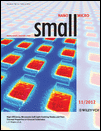
Small
metrics 2024
Navigating the Interplay of Small Materials and Big Ideas.
Introduction
Small is a premier academic journal published by WILEY-V C H Verlag GmbH, focusing on cutting-edge research across a multitude of disciplines including biomaterials, biotechnology, chemistry, engineering, materials science, medicine, and nanoscience. With an impressive impact factor and recognized in the top quartile (Q1) across these categories, Small serves as a vital platform for scientists and researchers aiming to disseminate innovative findings and explore the interplay between small-scale materials and their large-scale applications. Enjoying a broad readership, the journal has been key in advancing knowledge from its inception in 2005 and aims to foster collaborations and discussions that steer the future of material science and biotechnology. Though not open access, research published in Small remains invaluable for professionals and students eager to explore the advancements at the nanoscale, promoting a comprehensive understanding of modern scientific challenges and opportunities.
Metrics 2024
 3.35
3.35 13.00
13.00 13.50
13.50 294
294Metrics History
Rank 2024
Scopus
IF (Web Of Science)
JCI (Web Of Science)
Quartile History
Similar Journals
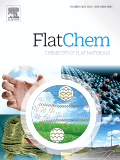
FlatChem
Championing Open Access for Groundbreaking Material ScienceFlatChem, an esteemed journal published by ELSEVIER, serves as a premier platform for disseminating high-quality research in the dynamic fields of ceramic and composite materials, electronic and optical materials, materials chemistry, and surfaces, coatings, and films. Since its inception in 2017, the journal has garnered a robust reputation, evidenced by its rank in the top quartile (Q1) across multiple categories, including a commendable rank of #25/127 in Ceramics and Composites and #49/284 in Electronic, Optical and Magnetic Materials. With a focus on pioneering advancements and innovative methodologies, FlatChem not only highlights cutting-edge research but also promotes collaboration and knowledge exchange within the scientific community. The journal’s impact is underscored by its impressive rankings in Scopus, marking it as a vital resource for researchers, professionals, and students aiming to stay at the forefront of materials science. As an open-access journal, it ensures that groundbreaking findings are readily accessible, fostering a broader understanding and application of materials innovation worldwide. The journal is based in the Netherlands, with its headquarters located at RADARWEG 29, 1043 NX AMSTERDAM, NETHERLANDS. Join the vibrant community contributing to FlatChem and engage with the forefront of material advancements.

BULLETIN OF MATERIALS SCIENCE
Unveiling Breakthroughs in Material DevelopmentBulletin of Materials Science, published by the Indian Academy of Sciences, is a distinguished journal that has been contributing to the field of materials science since its inception in 1979. With an ISSN of 0250-4707 and E-ISSN 0973-7669, it provides a platform for researchers to share groundbreaking studies and advancements in the mechanics of materials and general materials science. As of 2023, the journal holds a respectable Q3 ranking in both the Materials Science (miscellaneous) and Mechanics of Materials categories, highlighting its competitive position in the academic landscape. Although the journal currently does not operate under an open access model, it remains a vital resource for professionals and students keen on exploring innovative material developments and methodologies. With a commitment to promoting high-quality research, the Bulletin of Materials Science features rigorous peer-review processes, making it an essential reference for anyone engaged in the materials science domain.
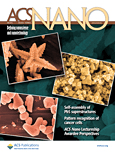
ACS Nano
Driving Discovery in the World of Nanoscale ResearchACS Nano, published by the American Chemical Society, stands as a prestigious journal in the domains of Engineering, Materials Science, Nanoscience, and Physics. With an exceptional impact factor reflecting its standing as a Q1 category journal in multiple disciplines, it plays a pivotal role in disseminating groundbreaking research from 2007 to 2024. Known for its rigorous peer-review process, the journal boasts impressive Scopus rankings—positioned at #1 in General Engineering and #6 in General Physics and Astronomy—placing it among the top 1% of journals in its field. Although it is not an open-access publication, ACS Nano provides a wealth of knowledge that is essential for advancing the development of nanotechnology and its applications across various industries. Researchers, professionals, and students alike will find in its pages a trove of innovative studies and insights that drive the future of materials science and engineering.

Advanced Materials Interfaces
Fostering Collaboration in Materials Engineering ExcellenceAdvanced Materials Interfaces is a premier journal dedicated to the exploration and advancement of materials science, with particular emphasis on the interfacial phenomena that govern the behavior of materials in various engineering applications. Published by WILEY in the United Kingdom, this Open Access journal, established in 2014, has quickly ascended to a Q1 category ranking in both Mechanical Engineering and Mechanics of Materials as of 2023, reflecting its significant influence and excellence in the field. With impressive Scopus Ranks, such as #81 out of 672 in Mechanical Engineering and #58 out of 398 in Mechanics of Materials, it serves as a vital resource for researchers and practitioners aiming to push the boundaries of materials innovation. The journal provides unrestricted access to its cutting-edge research, promoting collaboration and dissemination of knowledge among the global scientific community, solidifying its role as a vital contributor to the ever-evolving landscape of materials engineering.
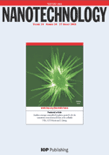
NANOTECHNOLOGY
Transforming Ideas into Nanotechnology Breakthroughs.NANOTECHNOLOGY is a premier academic journal published by IOP Publishing Ltd, focusing on cutting-edge advancements in the interdisciplinary field of nanoscience and nanotechnology. With a strong emphasis on research that bridges biology, chemistry, engineering, and materials science, this journal presents high-quality, peer-reviewed articles that cater to the diverse interests of researchers, professionals, and students alike. NANOTECHNOLOGY boasts an impressive ISSN: 0957-4484 and E-ISSN: 1361-6528, and holds a notable position within Scopus, ranked in the second quartile (Q2) across multiple categories including Bioengineering and Mechanical Engineering, underscoring its vital role in advancing the field. The journal's impact is further highlighted by its robust rankings, making it essential reading for those looking to stay at the forefront of nanotechnology research. Commencing in 1990 and with publication extending through to 2024, NANOTECHNOLOGY provides a unique platform for disseminating significant findings and innovative methodologies while fostering collaborations across various scientific disciplines. In a rapidly evolving technological landscape, this journal not only enhances academic discourse but also contributes to the practical applications of nanotechnology in real-world scenarios.

Nano Express
Advancing nanotechnology for a transformative future.Nano Express is an esteemed open-access journal published by IOP Publishing Ltd, dedicated to advancing research in the fields of nanotechnology and materials science. Since its launch in 2020, the journal has swiftly established itself as a vital resource for researchers and professionals, garnering significant recognition in various domains, including biomaterials, electronic, optical and magnetic materials, and polymers and plastics. With a commendable categorization in Scopus quartiles, it ranks in Q2 for Electronic, Optical and Magnetic Materials, and maintains a top percentile in several others, exemplifying its commitment to high-quality research dissemination. Located in the United Kingdom, this journal fosters a global dialogue among experts and newcomers alike, facilitating open access to innovative research that drives the future of nanotechnology. By offering a platform for groundbreaking studies and reviews, Nano Express aims to bridge the gap between theoretical understanding and practical application, championing the development of next-generation materials that have the potential to transform various industries.
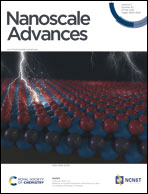
Nanoscale Advances
Transforming Ideas into Nanoscale Innovations.Nanoscale Advances, published by the Royal Society of Chemistry, stands out as a leading open-access journal dedicated to advancing the field of nanoscience and nanotechnology since its inception in 2018. With a specialized focus on areas such as atomic and molecular physics, bioengineering, chemistry, and materials science, this journal has consistently achieved top-tier rankings across several categories, reflecting its high-impact contribution to research and innovation. Currently classified in the Q1 quartile for both Atomic and Molecular Physics and Chemistry (Miscellaneous), and Q2 for Bioengineering, its prestige is underscored by impressive Scopus rankings, including a notable 34th position in General Engineering. With its commitment to disseminating high-quality research, Nanoscale Advances serves as an invaluable resource for researchers, professionals, and students alike, fostering collaboration and scholarly exchange in the rapidly evolving landscape of nanotechnology.
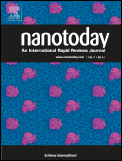
Nano Today
Catalyzing discoveries that shape tomorrow's innovations.Nano Today is a prestigious journal published by ELSEVIER SCI LTD that stands at the forefront of nanoscience and nanotechnology research. With an impact factor that underscores its significance, this journal has achieved remarkable rankings in several key categories as of 2023, including Q1 positions in Bioengineering, Biomedical Engineering, Biotechnology, Materials Science, and Pharmaceutical Science, making it an essential resource for scholars and professionals alike. ISSN 1748-0132 and E-ISSN 1878-044X, the journal serves as a vital platform for disseminating cutting-edge research findings and innovative applications in the field. Although open access options are not available, the journal's rich repository of peer-reviewed articles provides invaluable insights into the latest advancements in nanotechnologies. Based in the Netherlands, Nano Today not only connects a global network of researchers but also propels forward the conversation on the transformative potential of nanomaterials across multiple disciplines. With a commitment to advancing knowledge and fostering innovation, Nano Today is an indispensable tool for academics and practitioners dedicated to pushing the boundaries of scientific exploration.

Frontiers of Materials Science
Exploring the Future of Materials for a Sustainable TomorrowFrontiers of Materials Science is a groundbreaking journal dedicated to exploring advanced materials and their applications within the ever-evolving landscape of materials science. Published by HIGHER EDUCATION PRESS, this journal offers a crucial platform for scholars and practitioners seeking to disseminate innovative research findings that foster interdisciplinary collaboration. Since its inception in 2011, the journal has enjoyed a notable Q2 ranking in the category of Materials Science (miscellaneous) as of 2023, positioning it among the noteworthy publications in the field with a Scopus rank of #222 out of 463. While predominantly published in China, the journal is committed to open access principles, allowing global accessibility to cutting-edge research. With its comprehensive coverage spanning materials synthesis, characterization, properties, and applications, Frontiers of Materials Science not only serves as a repository for academia but also bridges the gap between research and industry, making it an indispensable resource for researchers, professionals, and students alike.

ACS Nanoscience Au
Connecting Ideas in Nanoscience and MaterialsACS Nanoscience Au, published by the American Chemical Society, is a leading open-access journal dedicated to the rapidly evolving field of nanoscience. Since its inception in 2021, this journal has established itself within the top quartiles of academic publishing, ranking Q1 in both Chemistry and Materials Science for 2023. With a commitment to disseminating high-quality research, it provides a platform for innovative findings in nanomaterials, nanotechnology applications, and associated interdisciplinary studies. The journal is based in the United States and embraces an open-access model, ensuring that research is freely accessible to a global audience. This initiative not only enhances the visibility of authors' work but also facilitates collaboration across scientific domains. As a vital resource for researchers, professionals, and students alike, ACS Nanoscience Au plays a crucial role in advancing knowledge in the nanoscience community.